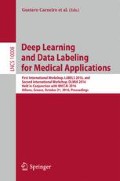Abstract
In this work we explore a fully convolutional network (FCN) for the task of liver segmentation and liver metastases detection in computed tomography (CT) examinations. FCN has proven to be a very powerful tool for semantic segmentation. We explore the FCN performance on a relatively small dataset and compare it to patch based CNN and sparsity based classification schemes. Our data contains CT examinations from 20 patients with overall 68 lesions and 43 livers marked in one slice and 20 different patients with a full 3D liver segmentation. We ran 3-fold cross-validation and results indicate superiority of the FCN over all other methods tested. Using our fully automatic algorithm we achieved true positive rate of 0.86 and 0.6 false positive per case which are very promising and clinically relevant results.
Access this chapter
Tax calculation will be finalised at checkout
Purchases are for personal use only
References
Ben-Cohen, A., Klang, E., Amitai, M., Greenspan, H.: Sparsity-based liver metastases detection using learned dictionaries. In: 2016 IEEE 13th International Symposium on Biomedical Imaging (ISBI), pp. 1195–1198 (2016)
Brosch, T., Yoo, Y., Tang, L.Y.W., Li, D.K.B., Traboulsee, A., Tam, R.: Deep convolutional encoder networks for multiple sclerosis lesion segmentation. In: Navab, N., Hornegger, J., Wells, W.M., Frangi, A.F. (eds.) MICCAI 2015. LNCS, vol. 9351, pp. 3–11. Springer, Heidelberg (2015)
Deng, X., Du, G.: Editorial: 3D segmentation in the clinic: a grand challenge II-liver tumor segmentation. In: MICCAI Workshop (2008)
Heimann, T., et al.: Comparison and evaluation of methods for liver segmentation from CT datasets. IEEE Trans. Med. Imaging 28(8), 1251–1265 (2009)
LeCun, Y., Bottou, L., Bengio, Y., Haffner, P.: Gradient-based learning applied to document recognition. Proc. IEEE 86, 2278–2324 (1998)
Li, W., Jia, F., Hu, Q.: Automatic segmentation of liver tumor in CT images with deep convolutional neural networks. J. Comput. Commun. 3(11), 146 (2015)
Long, J., Shelhamer, E., Darrell, T.: Fully convolutional networks for semantic segmentation. In: Proceedings of the IEEE Conference on Computer Vision and Pattern Recognition, pp. 3431–3440 (2015)
Roth, H., Lu, L., Liu, J., Yao, J., Seff, A., Cherry, K., Kim, L., Summers, R.: Improving computer-aided detection using convolutional neural networks and random view aggregation. IEEE Trans. Med. Imaging, (2015, pre-print)
Rusko, L., Perenyi, A.: Automated liver lesion detection in CT images based on multi-level geometric features. Int. J. Comput. Assist. Radiol. Surg. 9(4), 577–593 (2014)
Setio, A.A., Ciompi, F., Litjens, G., Gerke, P., Jacobs, C., van Riel, S., Wille, M.W., Naqibullah, M., Sanchez, C., van Ginneken, B.: Pulmonary nodule detection in CT images: false positive reduction using multi-view convolutional networks. IEEE Trans. Med. Imaging, (2016, pre-print)
Shimizu, A., et al.: Ensemble segmentation using AdaBoost with application to liver lesion extraction from a CT volume. In: Proceedings of Medical Imaging Computing Computer Assisted Intervention Workshop on 3D Segmentation in the Clinic: A Grand Challenge II, New York (2008)
Simonyan, K., Zisserman, A.: Very deep convolutional networks for large-scale image recognition. arXiv preprint arXiv:1409.1556 (2014)
Vedaldi, A., Lenc, K.: MatConvNet: convolutional neural networks for matlab. In: Proceedings of the 23rd Annual ACM Conference on Multimedia Conference, pp. 689–692 (2015)
The World Health Report, World Health Organization (2014)
Acknowledgment
Part of this work was funded by the INTEL Collaborative Research Institute for Computational Intelligence (ICRI-CI).
Author information
Authors and Affiliations
Corresponding author
Editor information
Editors and Affiliations
Rights and permissions
Copyright information
© 2016 Springer International Publishing AG
About this paper
Cite this paper
Ben-Cohen, A., Diamant, I., Klang, E., Amitai, M., Greenspan, H. (2016). Fully Convolutional Network for Liver Segmentation and Lesions Detection. In: Carneiro, G., et al. Deep Learning and Data Labeling for Medical Applications. DLMIA LABELS 2016 2016. Lecture Notes in Computer Science(), vol 10008. Springer, Cham. https://doi.org/10.1007/978-3-319-46976-8_9
Download citation
DOI: https://doi.org/10.1007/978-3-319-46976-8_9
Published:
Publisher Name: Springer, Cham
Print ISBN: 978-3-319-46975-1
Online ISBN: 978-3-319-46976-8
eBook Packages: Computer ScienceComputer Science (R0)

